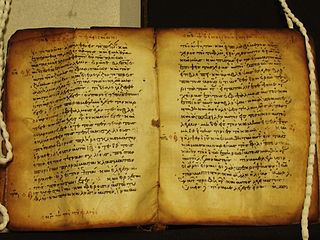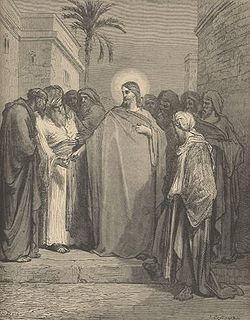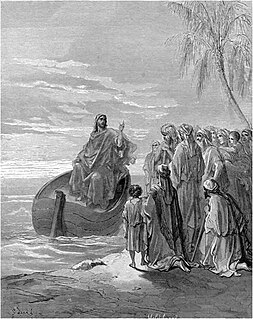
Matthew 3:7 is the seventh verse of the third chapter of the Gospel of Matthew in the New Testament. The verse occurs in the section introducing John the Baptist. In this verse John attacks the Pharisees and Sadducees.

Matthew 5:1 and Matthew 5:2 are the first two verses of the fifth chapter of the Gospel of Matthew in the New Testament. The verses introduce the Sermon on the Mount that will be recited in the next several chapters. The previous verse mentioned the large crowds "from Galilee, and from the Decapolis, Jerusalem, Judea, and beyond the Jordan" who followed Jesus to witness him healing: these verses present Jesus as seeing the crowds and going up onto a mountain to begin teaching.

Mark 8 is the eighth chapter of the Gospel of Mark in the New Testament of the Christian Bible. It contains two miracles of Jesus, Peter's confession that he believes Jesus is the Messiah, and Jesus' first prediction of his own death and resurrection. It is the middle chapter of the gospel but its significance is variously understood: for example the Jamieson-Fausset-Brown Bible Commentary calls it a "section of miscellaneous matter" whereas many commentators treat it as a turning point where Mark's description of Jesus as teacher and miracle worker gives way to his focus on the role of Jesus' death and the difficult nature of his teachings.

Matthew 22 is the twentieth-second chapter in the Gospel of Matthew in the New Testament section of the Christian Bible. Jesus continues his final ministry in Jerusalem before his Passion. Teaching in the Temple, Jesus enters into debate successively with the Pharisees, the Herodians and the Sadducees, ultimately silencing them all.

Matthew 7:28 is the twenty-eighth verse of the seventh chapter of the Gospel of Matthew in the New Testament. It forms the first part of a two verse conclusion following the Sermon on the Mount.

Matthew 13:3 is the third verse in the thirteenth chapter of the Gospel of Matthew in the New Testament.
Matthew 9:11 is a verse in the ninth chapter of the Gospel of Matthew in the New Testament.
Matthew 9:13 is a verse in the ninth chapter of the Gospel of Matthew in the New Testament.
Matthew 9:14 is a verse in the ninth chapter of the Gospel of Matthew in the New Testament.
Matthew 11:16 is the sixteenth verse in the eleventh chapter of the Gospel of Matthew in the New Testament.
Matthew 9:35 is a verse in the ninth chapter of the Gospel of Matthew in the New Testament.
Matthew 11:25 is the 25th verse in the eleventh chapter of the Gospel of Matthew in the New Testament.
Matthew 15:11 is a verse in the fifteenth chapter of the Gospel of Matthew in the New Testament.
Matthew 15:12 is a verse in the fifteenth chapter of the Gospel of Matthew in the New Testament.

Matthew 15:1 is a verse in the fifteenth chapter of the Gospel of Matthew in the New Testament.

John 1:46 is the 46th verse in the first chapter of the Gospel of John in the New Testament of the Christian Bible.
Matthew 11:4-6 is a set of verses in the eleventh chapter of the Gospel of Matthew in the New Testament.

Matthew 13:1-2 are the first two verses in the thirteenth chapter of the Gospel of Matthew in the New Testament.
Matthew 14:15-21 is a set of verses in the fourteenth chapter of the Gospel of Matthew in the New Testament.
Matthew 15:15-18 is a set of verses in the fifteenth chapter of the Gospel of Matthew in the New Testament.









